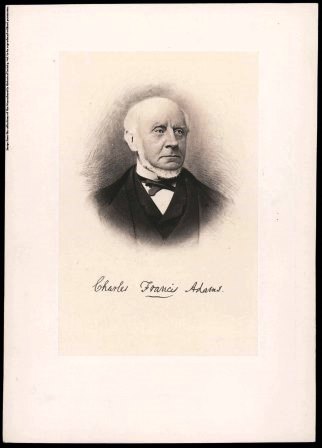By Gwen Fries, Adams Papers
On a drizzly February morning in 1848, Charles Francis Adams, son of John Quincy Adams, walked into his Boston office. As he reached his desk, Adams noticed a telegraph that communicated that his father “whilst in his seat at the House of Representatives at half past one o’clock was taken in another fit of paralysis and that it was not thought he could survive the day,” CFA wrote in his diary. Adams was on the next train south.

Charles Francis Adams, Photogravure, from “Portraits of American Abolitionists,” MHS.
Delays prevented Adams from making his connection to Philadelphia. As he waited for the next train, Adams began reading the book his wife had sent with him, Jane Eyre. That night, February 23rd, he anxiously read a newspaper that had reports from 11 p.m. on the 22nd that John Quincy “lingered.”
The next morning, while on the train to Baltimore, Charles Francis opened that day’s paper.
The first thing I saw was the announcement that at a quarter past seven last night my father had ceased to breathe. . . . Here then it is in all its reality— I have no longer a Father.
After another short layover in Baltimore, Charles Francis reached his parents’ home in Washington, D.C. He went straight upstairs to comfort his mother, Louisa Catherine. Charles Francis sat with her until it was time to go to bed.
She then told me she had no place to put me in but his room— And I went to it, just as he had left it on Monday morning: Yes there was his table and chair, his papers and writing materials, his bed and all his materials for his late sick life. And the animating spirit was not there and I was.
Charles Francis got little sleep.
The next day, his mother was “in a low, fainting state all day, and utterly unable to say any thing.” After a morning of greeting acquaintances and thanking them for their condolences, Charles Francis traveled to the House. He was ushered through crowds to the coffin, where he was left alone. “And here I was to take my last look upon one to whom for forty years I had been looking for support and aid and encouragement!” Charles Francis studied his father’s face through a glass pane and considered his future responsibilities. Poignantly, Adams reflected that he was “alone in the generation,” as his two older brothers and younger sister had all already passed away. He shed a few tears before returning to the committee room to discuss arrangements “until every nerve in me quivered.”
His mother being too unwell to attend, Charles Francis represented his family at the funeral. As he stood on the steps of the Capitol waiting for his carriage, he felt acutely the curious eyes of gawkers and resolutely stared ahead, reflecting on his father’s influence. “He has been the great landmark of my life,” Charles Francis wrote. “My stay and companion.” As he descended the stairs and climbed into the carriage, Adams prepared himself to become the Adams patriarch. “For the future I must walk alone and others must lean on me.”

